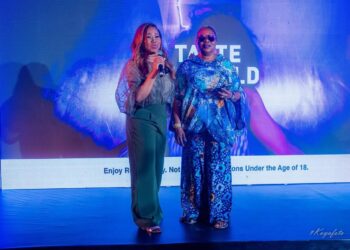Justice Hyeladzira Nganjiwa of Federal High Court, Bayelsa Division, was on Friday docked at a Lagos High Court sitting in Igbosere for alleged unlawful financial enrichment.
The Economic and Financial Crimes Commission, EFCC, arraigned Mr. Nganjiwa on a 14-count charge bordering on unlawful financial enrichment to the tune of $260,000 and N8.7 million (approximately N81.7 million).
He pleaded not guilty to all the 14 counts.
The News Agency of Nigeria reports that the defendant’s counsel, Robert Clarke, had on June 13, when the case first came up, opposed the arraignment of the judge before a Lagos High Court at Igbosere.
Mr. Clarke said the court presided over by Justice Adedayo Akintoye lacked the jurisdiction to hear and determine the case.
According to him, the defendant, who is a sitting judicial officer as defined in the constitution, can only subject himself to the discipline of the National Judicial Council, NJC.
He urged the court to dismiss the case, adding that due process should be followed.
Mr. Clarke also argued that the information filed offended the provisions of Section 158 (1) and paragraph 21 of the Third Schedule of the Constitution which established judicial precedents and authorities.
But the EFCC Prosecutor, Rotimi Oyedepo, urged the court to dismiss the preliminary objection, pointing out that the application is asking the court to immune the defendant from prosecution because he is a sitting judge.
Mr. Oyedepo cited Sections 308 and 35 (1) (c) of the Constitution to puncture the argument of the defence counsel that a sitting judge cannot be prosecuted.
He said among other things that the defendant did not fall within the persons mentioned in provisions of Section 308 and, therefore, could not enjoy immunity from prosecution.
He said that the charge was not brought against the NJC, rather the charge was against Mr. Nganjiwa in his personal capacity.
Mr. Oyedepo, therefore, urged the court to dismiss the objection and call the defendant to take his plea.
In her ruling, Justice Akintoye, said the court had the jurisdiction to hear and entertain the case.
She said: “It is trite that the court can entertain and determine the rights of any citizen. It is, therefore, not correct that the court does not have jurisdiction to entertain this case.”
The judge asked the defendant: “Being a judicial officer of the Federal Government, is there any law that excludes judicial officers from being charged?”
“I affirm that the NJC has power to discipline any judicial officer, but judicial officers are not immune from being preferred with criminal liability.
“It is only the office of the president, vice-president, or executive governor of any state that are immune from criminal liabilities while in office.
“So, the defendant does not have immunity under Section 308 of the 1999 Constitution; therefore, the court has been properly constituted and has the pow
er to try this case.
“The notice of preliminary objection, I hold, is therefore, misconceived and same is hereby dismissed,” Mr. Akintoye ruled.
After the ruling on the court’s jurisdiction, the charge was read to the defendant and his plea was taken.
The two parties, however, argued on the bail application made by the counsel to the defendant, who urged the court to grant him bail on own recognizance as a sitting judge.
The prosecutor opposed the bail to be granted to the defendant on own recognizance, saying that there is no guarantee that the defendant will continue to sit as a judge.
Justice Akintoye, after listening to the arguments, granted bail to Mr. Nganjiwa on self-recognizance.
She however, ordered that the defendant should deposit his international passport with the Chief Registrar of the High Court within seven days of the ruling.
Hearing in the case has been fixed October 6.
Judge accused of corruption granted bail on own recognizance
0
Leave a Reply Cancel reply
BROWSE BY CATEGORIES
- #SmartLagos
- Basketball
- Beauty
- Boxing
- Breaking
- Business
- Careers
- Crime
- Default
- Education
- Entertainment
- Event
- Fashion
- Featured
- Football
- Gaming
- Gist
- Golf
- Health
- Inspirational Patience
- Interview
- Investigative
- Law
- Lifestyle
- local
- MetroMan
- MetroPerson
- metroplus
- MetroProfile
- Movies
- Music
- MUSIC
- New Music
- News
- nolly wood
- Nollywood
- Novels
- Odawood
- Opinion
- Parenting
- Photos
- Politics
- Press Release
- Relationship
- Religion
- Scandal
- Security
- Sex
- Society
- Sports
- Technology
- Travel
- TV
- Videos
- Weird
- Wheels
- World
BROWSE BY TOPICS
#COVID19Nigeria
#EndSARS
Adams Oshiomhole
Akinwunmi Ambode
APC
ASUU
atiku
Atiku Abubakar
Big brother Naija 2020
boko haram
Buhari
Bukola Saraki
CBN
court
COVID-19
davido
ECOWAS
Edo Election
Edo State Election
efcc
Featured
FG
Goodluck Jonathan
gunmen
INEC
Kayode Fayemi
Lagos
Lagos State
Muhammadu Buhari
NCDC
NDLEA
news
Niger
Nigeria
NLC
Obaseki
PDP
police
politics
President Buhari
Sanwo Olu
senate
tinubu
wike
Yemi Osinbajo
© Copyright MetroNews NG 2020. All rights reserved.









